Interview
Interview: Holly Edwards
In conversation with predominantly self-taught Ontario-based abstract artist Holly Edwards who works from her detached studio at her house.
Can you talk about your journey into or interest in the arts?
I can’t remember a time when I wasn’t interested in the arts. Both my Mom and Gramma were talented artists and I was always encouraged to draw and paint. As a young child, I was either playing outside, reading a book, or colouring. As I got older, I would take the occasional art class, and I was always encouraged – always. I hear stories all the time of an influential figure crushing a young person’s art dream; that never happened to me. Yet in a way I rebelled against the artistic path that was laid out for me so naturally. In grade eight, I received the school visual arts award and secretly wished it was the drama award instead: I wanted to be an actress, which is funny now as I am terrified of public speaking! I attended a high school for visual arts just outside of Toronto, and looking back I see how valuable that experience was to my art practice today. And again, the encouragement! My teachers and family all felt strongly that I should attend art college, but I was stubbornly defiant; I’m not even sure why I fought it. If I am being honest, not attending art college is my biggest regret.
Instead, I went off to university to pursue Kinesiology, but I wasn’t happy with the program and I eventually switched to Philosophy. As the years passed, I would be constantly reminded of art, like someone was whispering in my ear from far away: don’t forget! When my husband Jeff and I moved into our home 16 years ago in the small village of Lakefield, there was a detached white stucco garage in our yard and Jeff said to me it would make the perfect art studio.
At the time art was the furthest thing from my mind, and I remember thinking what a strange thing to say! My in-laws bought me an easel for my birthday around this time and so I started painting again (it would be rude not to). After my daughter was born I started thinking about what I would like to do when I returned to work, as all my employment thus far had been contract work and nothing I enjoyed. My parents kept saying “what about your art?”, and the whispering was almost like yelling now. As soon as my son started junior kindergarten I began taking art classes and it snowballed from there. Two years ago we converted the garage into my studio.
Do you use a sketchbook? I’m interested in what a sketchbook means to you and your work?, or how people develop their ideas.
Yes, I have always had a sketchbook of some sort, but its meaning for me has changed over the years. When we moved to Lakefield, I found my sketchbook from high school and it was full of rather morbid images and personal poetry. I was horrified that something that raw about me existed and I promptly burned it! Now my sketchbooks are strictly visual and I use them as perhaps a musician might practice scales, as a sort of warm up and a discipline. I feel that I have to practice everyday to get better, and a quick sketch makes this possible.
For the past six years I have been committed to creating art every day and an informal sketch certainly feels doable, and usually once a sketch is made I feel encouraged to create something else. I find paper generally less precious than canvas or a board and therefore easier for me to create freely with. I have been taking life-drawing classes weekly for the past few years and I feel a similar freedom and surprise with the work I create on newsprint paper. I guess what I am trying to say is that it is very freeing to have a sketchbook: it is affordable, portable, and anything goes!
Your work is abstract in nature. What are you exploring though this and is the process of making art something that is personal to you, or is it about the viewer?
I used to paint much more impressionistic, realistic images, but my first art teacher (on my rediscovered art journey) was/is an abstract artist and I was certainly influenced by her work. I remember painting pretty flowers, and her asking me if that’s what I really want to paint. I kept mulling this over. It wasn’t until I took an abstract figurative workshop with another wonderful teacher that my art really started to change.
I realized/remembered how much I enjoyed the challenge of life drawing in high school, and I began to discover different ways of approaching those drawings in an abstract way. I liked having a starting point (the figure) that I could take off with and suddenly there were no limits, it was all about colours and shapes and feelings and this freedom appealed to me.
When I was painting more realistically, I had to be conscientious of my lines and marks, like I was in a box with parameters. Abstract that image now, be it a landscape, a flower, a figure, and suddenly I could stretch my creativity as far as I could imagine. No, forget the box: It was like I had been working in the confines of an elastic band, and suddenly finding myself stretching the band as far as I could, and then finally cutting the band. And I didn’t have to stop there, at one cut. I could cut that elastic band into many pieces, yet some piece of that band still existed even if only one tiny piece remained in my art, if that makes sense…
Abstract art also lends itself to exploring mixed media and being messy, two things I enjoy. I could go on and on… but I have lost track of your questions!
Absolutely the process of making art is personal; if it was only about the viewer I would still be painting my lovely flowers, which were appealing to many people and very sellable. I suppose it is about the viewer in the sense that I am constantly trying to prove myself – that despite not having an art degree and being a mature emerging artist, I have something to say and I want to be taken seriously. The only difference between myself now and six years ago, is that I let the art decide what I say, not what I feel I should create or what might sell.
By this I mean that regardless of what art I am creating: a sketch, a painting, a sculpture, a collage, I am constantly making a mark and responding to that mark, and in that sense the art changes despite my original vague idea or direction. Is that next mark completely personal, or is it influenced by the viewer? I couldn’t say.
What is it specifically about collage that you like to work with?
Collage is a new and exciting art form for me that began with the pandemic. Three months ago, I found myself unexpectedly homeschooling my two children in grade 4 and grade 8, and Jeff was suddenly working from home; he took over the studio and I found myself displaced inside our small house. Being a creative person, I readjusted to the new situation the only way I saw possible. Painting was no longer an option but I had PILES of paper studies from life drawing sessions and discarded sketchbooks. I brought all those inside along with paintings that I planned on reworking (I often paint over my work) and I started cutting out body limbs and colour blocks and reimagining old works.
During a stressful time in my life this playful montage of whatever took my fancy was exactly what I needed. Not only was it an escape from the grim news I was hearing, but I could work away at it here and there throughout the day as I readjusted to my new life and responsibilities. In doing this I found a real passion for collage that felt natural to the previous abstract work I was doing of mixing media and working in layers. I liked being able to recycle the bits of art that I liked but that didn’t work as it was in the original context. Being able to cut out some legs (the only part of the drawing I liked) and stick them in a fruit bowl that felt lacking, was empowering and novel to me.
Sometimes when I am painting, I enter a dark area where there is no where out because I have overworked beyond repair; with collage, I discovered, I can simply paste over top and all is saved. Having that sort of flexibility allows for even more experimentation and pushing of limits. Whereas before I may have been hesitant to follow a whim, now I can create art with complete reckless abandon because the mark that I am responding to isn’t going to wreck the entire piece.
Can you talk about your process of working? How do you work, how often, is there a particular pattern?
I feel I must practice every day, and I am rather hard on myself: there is no excuse for me not to do something, even if it is a quick sketch or doodle (often that is all I have time for in these new circumstances). There is so much to learn, and I feel I have years of lost time to catch up on! And the more I learn through trial and error, the more opportunities present themselves to explore new directions and move forward where previously I was stuck. I take my art practice very seriously: even if I am having fun and just playing in the studio, I am learning something and to me those moments are valuable. Before the kids were home, my art work schedule was 9-3, with lots of coffee breaks and time to walk the dog.
Prior to the pandemic I would set up in my studio with CBC Radio or some music and a strong coffee and begin by reading a bit of art history. Having not gone to art college, I try to read as much as possible – if I am feeling out of sorts, I might read more and paint less. Then I might sketch a bit, maybe something abstract or non objective. Sometimes I am working through an idea and need to work in a series; once I sketched a portrait everyday for several months. I always have several paintings on the go and I work a bit on each one, and depending on the materials I am using there may be some drying time involved. I spend a lot of time just looking at my art wondering. Standing back and contemplating. Reworking, wondering. When to stop? That’s the most difficult question for me.
Do you find the process of creating work relaxing or therapeutic? I’ve become increasingly interested in the relationship of the sketchbook and the work to the artist.
I would say that creating work is always therapeutic for me. Any emotion I am feeling provides ammo for my work which is usually positive as it gets the piece moving. The longer I am creating though, the more relaxing it becomes and that is also good. There is something very quiet and meditative about creating art. It often feels like being outside in nature and I eventually lose myself in it, even if my emotions are bouncing around in the beginning.
A sketchbook is a fascinating aspect of an artists’ life and practice. It is often quite different from the polished work that we see – more exposed, and experimental. I am feeling rather inspired, thinking of these unseen, unknown, mysterious sketchbooks and what insights they might provide an artist! Perhaps I shall begin a new sketchbook now: one that I don’t share, more like a diary of sorts… it would be fascinating to see where those private ideas may take my art.

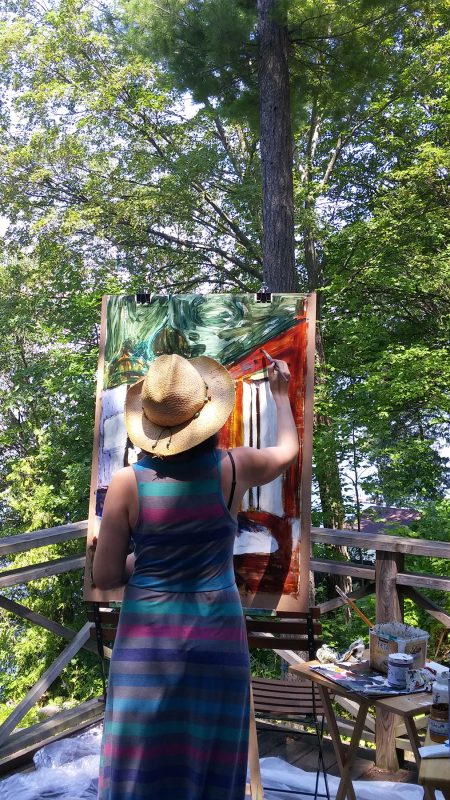
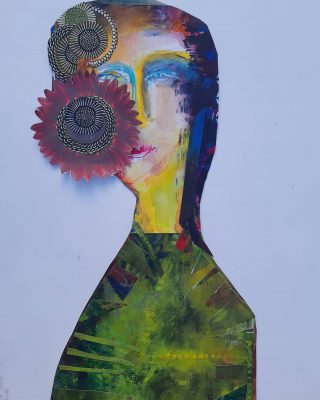
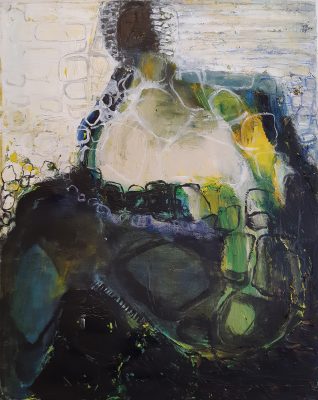
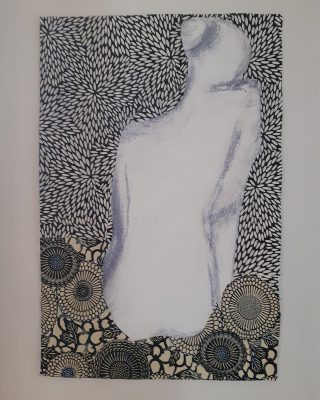
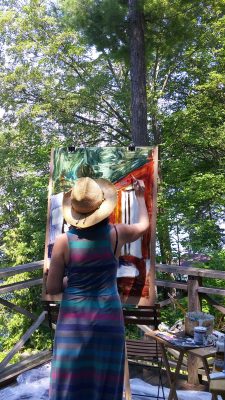
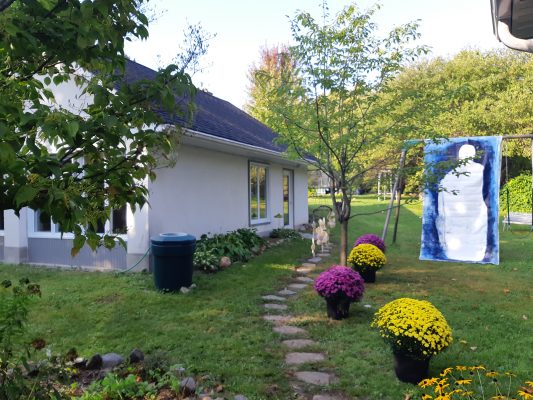
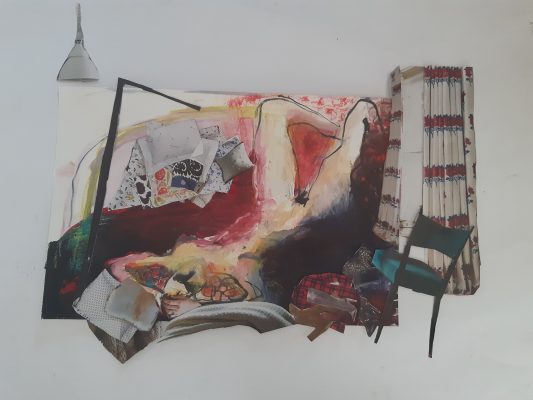
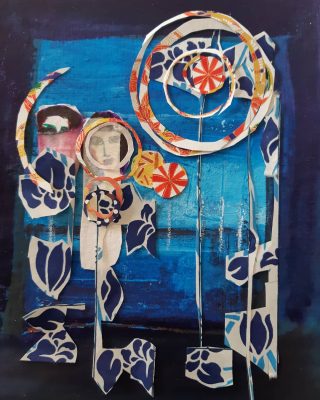
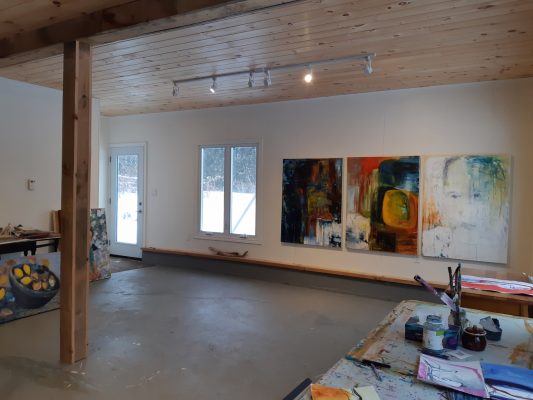
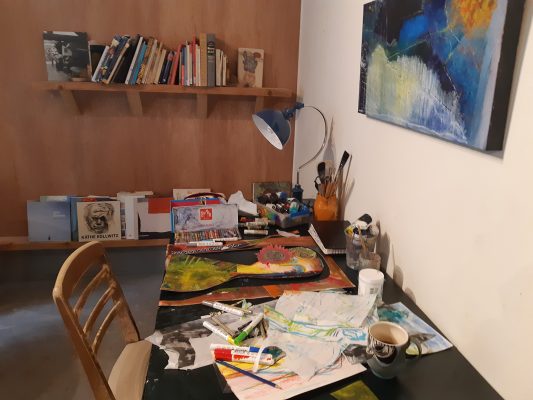
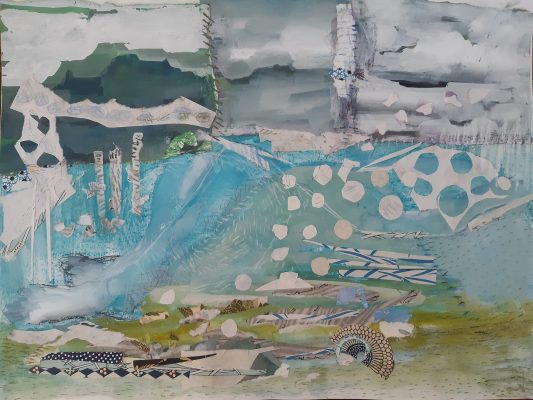
Do you like this artist?
If so, why not write a comment or share it to your social media. Thanks in advance if you can help in this way.